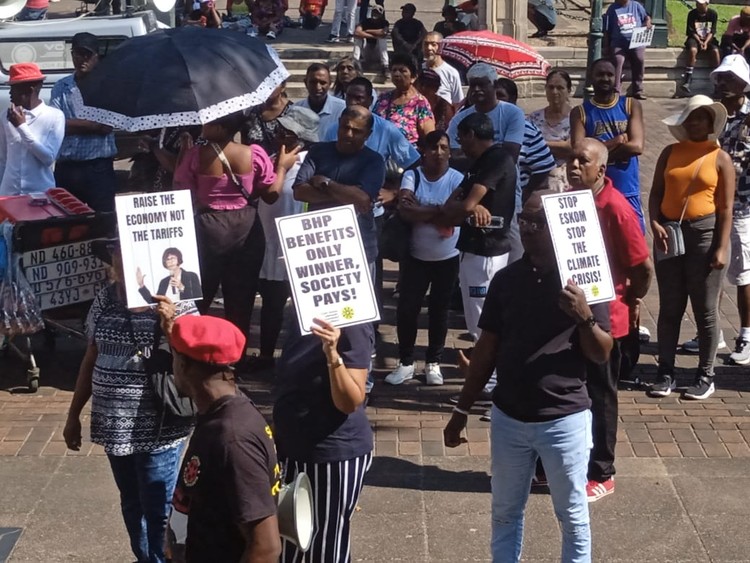Scrap electricity tariff hikes, demand Durban residents
Public comment on increases for ratepayers in eThekwini closed on Friday
About 100 people marched to the Durban City Hall on Friday to oppose soaring electricity tariffs. Photo: Nokulunga Majola
Should Eskom’s proposed tariff increase be accepted, more families will have to allocate a larger portion of their meagre income to pay for electricity, says Verushka Memdutt of the South African Informal Traders Forum in Durban.
Memdutt was among about 100 eThekwini residents and members of a coalition of grassroots organisations, including Abahlali BaseMjondolo, Ubunye Bamahostela and Right2Know, who marched to the Durban City Hall on Friday afternoon.
The march, led by the South Durban Community Environmental Alliance (SDCEA), comes after various recent community meetings where residents voiced concerns over rising electricity tariffs and municipal bills.
Electricity tariffs increased by 18.5% last year and the municipality is proposing a further 14% this year.
The eThekwini municipality is also proposing increasing property rates by 8% and tariffs for waste removal by 8%, sanitation services by 13%, and water by 15%. Mayor Mxolisi Kaunda announced these adjustments when presenting his draft budgets for the metro.
EThekwini spokesperson Gugu Sisilana said the proposed tariff increases had not been approved by the council and public consultation was still underway.
The municipality’s proposed budget for 2024/25 is R67.3-billion.
The deadline for comments was Friday.
But Memdutt and others marching on Friday are worried that their concerns had fallen on deaf ears and the increases will go ahead.
“Poor families may have less money for other necessities like food, education, and healthcare. Higher tariffs further squeeze profit margins, making it harder for small businesses to survive,” she said.
The Alliance called for the swift implementation of renewable energy and storage systems to save money and to scrap tariff increases.
“Communities are already impoverished by 15 years of price hikes, driven up way beyond the rate of inflation by the escalating costs of Eskom’s corrupt Medupi and Kusile coal-fired power stations, which back in 2010 SDCEA was the lead NGO in the campaign to halt financing.
“At municipal level, our clear demand is that our government should support socially-owned, renewable energy systems and help us with climate adaptation to avoid the kinds of rain bombs that were so devastating a year ago, and that left the city utterly unprepared for 500 deaths and tens of billions of rands worth of damage,” said Desmond D’Sa, head of SDCEA.
The memorandum was accepted by Sibusiso Nzimande, chief director in the office of the Premier, and Mlungisi Ntombela from the Mayor’s office.
Next: Trains are running again on Metrorail’s Southern Line but the embankment needs attention
Previous: Corruption accused Edwin Sodi’s company still not blacklisted by Treasury
© 2024 GroundUp. This article is licensed under a Creative Commons Attribution-NoDerivatives 4.0 International License.
You may republish this article, so long as you credit the authors and GroundUp, and do not change the text. Please include a link back to the original article.
We put an invisible pixel in the article so that we can count traffic to republishers. All analytics tools are solely on our servers. We do not give our logs to any third party. Logs are deleted after two weeks. We do not use any IP address identifying information except to count regional traffic. We are solely interested in counting hits, not tracking users. If you republish, please do not delete the invisible pixel.



